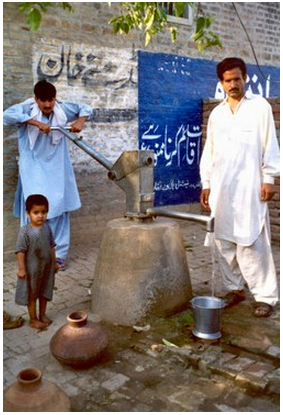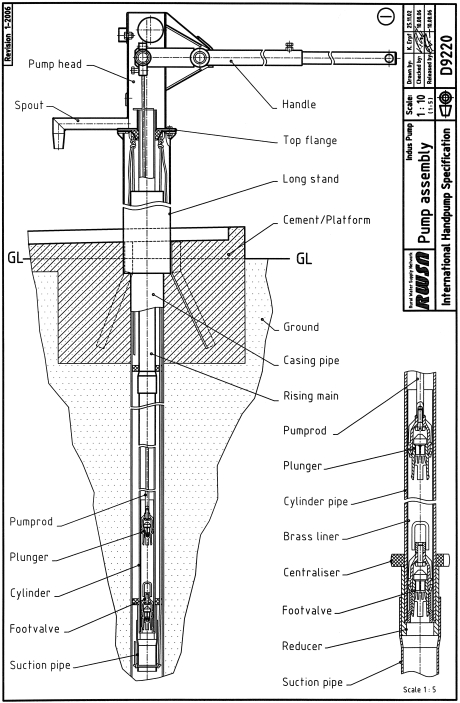Difference between revisions of "Indus pump"
| (18 intermediate revisions by the same user not shown) | |||
| Line 1: | Line 1: | ||
| + | {{Language-box|english_link= Indus_pump | french_link= Coming soon | spanish_link= Coming soon | hindi_link= Coming soon | malayalam_link= Coming soon | tamil_link= Coming soon | swahili_link=coming soon | korean_link= Coming soon | chinese_link=印度河泵 | indonesian_link= Coming soon | japanese_link= Coming soon }} | ||
| − | The Indus pump | + | [[Image:lever action icon.png|right|80px]] |
| + | [[Image:indus pump.jpg|thumb|right|200px|The Indus pump. Photo: [http://www.rural-water-supply.net/en/implementation/public-domain-handpumps/indus-kabul-pamir-pumps RWSN.]]] | ||
| + | [[Image:Indus engineer drawing.jpg|thumb|right|200px|The Indus engineer drawing of parts. Click to zoom image. Photo: [http://www.rural-water-supply.net/_ressources/documents/default/INDUS-KABUL-PAMIR_Specification_Rev-1-2006.pdf INDUS-KABUL-PAMIR Specification.] RWSN.]] | ||
| − | + | The Indus pump is a conventional lever action handpump. It is designed for heavy-duty use, serving communities of 300 persons. The maximum recommended lift is 45 m. The Indus pump is similar to the [[Kabul pump]] (a lighter version that is a more shallow pump) and the [[Pamir pump]] (a deeper pump). | |
| − | ==Suitable conditions== | + | The Indus pump is not fully corrosion resistant; rods are subject to rusting. The Indus pump is a public domain pump defined by RWSN specifications, only used in Afghanistan and Pakistan. It is easy to install and have excellent potential for community-based maintenance. The configuration includes an “open top” cylinder: the piston can be removed from the cylinder without dismantling the rising main. The foot valve is retractable with a fishing tool. |
| + | |||
| + | ===Suitable conditions=== | ||
Distribution: tens of thousands in Pakistan & Afghanistan.<br> | Distribution: tens of thousands in Pakistan & Afghanistan.<br> | ||
In Pakistan and in Afghanistan, the use of stainless steel components is uncommon; therefore, these pumps should not be used as substitutes for the [[Afridev pump]]. | In Pakistan and in Afghanistan, the use of stainless steel components is uncommon; therefore, these pumps should not be used as substitutes for the [[Afridev pump]]. | ||
| + | |||
| + | The Indus pump is suitable to be installed in boreholes and dug wells: | ||
| + | * Boreholes: for casing sizes of nominal 100 mm, 115 mm, 127 mm, 150 mm, or 200 mm internal diameter. | ||
| + | * Dug wells: if pump is to be used in dug wells then an iron clamp must be used to locate the rising main. | ||
| Line 12: | Line 21: | ||
|- | |- | ||
|Depths to be used: | |Depths to be used: | ||
| − | | | + | |45 m |
|- | |- | ||
|Cylinder diameter: | |Cylinder diameter: | ||
| Line 43: | Line 52: | ||
| − | ==Construction, operations and maintenance== | + | ===Construction, operations and maintenance=== |
Pump head, handle and pump stand are made of galvanised steel, pump rods of mild steel, rising main of PVC-U pipe (Ø63 mm), cylinder of PVC-U pipe with brass liner (Ø50 mm), plunger and foot valve are of plastic. This pump is not fully corrosion resistant, the rods are subject to corrosion. | Pump head, handle and pump stand are made of galvanised steel, pump rods of mild steel, rising main of PVC-U pipe (Ø63 mm), cylinder of PVC-U pipe with brass liner (Ø50 mm), plunger and foot valve are of plastic. This pump is not fully corrosion resistant, the rods are subject to corrosion. | ||
| Line 51: | Line 60: | ||
This pump has an excellent “Community Management Potential”, it is reliable, easy to repair by a village caretaker and popular with the communities. | This pump has an excellent “Community Management Potential”, it is reliable, easy to repair by a village caretaker and popular with the communities. | ||
| + | |||
| + | ===Manuals, videos and links=== | ||
| + | * Complete specifications: [http://www.rural-water-supply.net/_ressources/documents/default/INDUS-KABUL-PAMIR_Specification_Rev-1-2006.pdf Handpump Specification for: Indus pump, Kabul pump, Pamir pump.] RWSN. Revision 1-2006. | ||
| + | |||
| + | ===Acknowledgements=== | ||
| + | * [http://www.rural-water-supply.net/en/implementation/public-domain-handpumps/indus-kabul-pamir-pumps Implementation • Handpump Technology: Indus, Kabul & Pamir Pumps.] RWSN. | ||
| + | * Eng. Wahidullah Khoram and Karl Erpf. [http://www.rural-water-supply.net/_ressources/documents/default/INDUS-KABUL-PAMIR_Specification_Rev-1-2006.pdf Handpump Specification for: Indus pump, Kabul pump, Pamir pump.] RWSN. Revision 1-2006. SKAT. | ||
Latest revision as of 00:27, 12 April 2017
| |
|
|
|
|
|
|
|
|
|


The Indus pump is a conventional lever action handpump. It is designed for heavy-duty use, serving communities of 300 persons. The maximum recommended lift is 45 m. The Indus pump is similar to the Kabul pump (a lighter version that is a more shallow pump) and the Pamir pump (a deeper pump).
The Indus pump is not fully corrosion resistant; rods are subject to rusting. The Indus pump is a public domain pump defined by RWSN specifications, only used in Afghanistan and Pakistan. It is easy to install and have excellent potential for community-based maintenance. The configuration includes an “open top” cylinder: the piston can be removed from the cylinder without dismantling the rising main. The foot valve is retractable with a fishing tool.
Contents
Suitable conditions
Distribution: tens of thousands in Pakistan & Afghanistan.
In Pakistan and in Afghanistan, the use of stainless steel components is uncommon; therefore, these pumps should not be used as substitutes for the Afridev pump.
The Indus pump is suitable to be installed in boreholes and dug wells:
- Boreholes: for casing sizes of nominal 100 mm, 115 mm, 127 mm, 150 mm, or 200 mm internal diameter.
- Dug wells: if pump is to be used in dug wells then an iron clamp must be used to locate the rising main.
| Depths to be used: | 45 m |
| Cylinder diameter: | 50.0 mm |
| Maximum Stroke: | 225 mm |
| Approx. discharge (75 watt input): | at 10 m head: 1.4 m³/hour at 15 m head: 1.1 m³/hour |
| Pumping lift: | 10 - 45 m |
| Population served: | ~ 300 people |
| Households: | 30 - 50 hh |
| Water consumption: | 15-20 lt/per capita |
| Type of well: | borehole or dug well |
Construction, operations and maintenance
Pump head, handle and pump stand are made of galvanised steel, pump rods of mild steel, rising main of PVC-U pipe (Ø63 mm), cylinder of PVC-U pipe with brass liner (Ø50 mm), plunger and foot valve are of plastic. This pump is not fully corrosion resistant, the rods are subject to corrosion.
All parts of this pump have a potential for local manufacturing in Afghanistan and Pakistan. Local companies who manufacture PVC-U pipes and have the knowledge of processing engineering plastics are able to produce the “down-hole components”. The cost of the tooling is high and therefore the number of manufacturer will be limited.
Installation of the Indus pump is not difficult and does not need any lifting equipment. It is however recommended that a well-trained crew with the necessary skills perform the installation.
This pump has an excellent “Community Management Potential”, it is reliable, easy to repair by a village caretaker and popular with the communities.
Manuals, videos and links
- Complete specifications: Handpump Specification for: Indus pump, Kabul pump, Pamir pump. RWSN. Revision 1-2006.
Acknowledgements
- Implementation • Handpump Technology: Indus, Kabul & Pamir Pumps. RWSN.
- Eng. Wahidullah Khoram and Karl Erpf. Handpump Specification for: Indus pump, Kabul pump, Pamir pump. RWSN. Revision 1-2006. SKAT.
